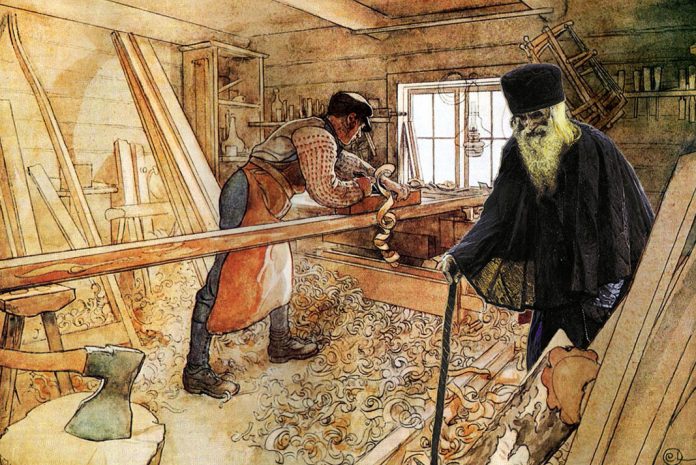I wrote this parable back in late 2010 as I was going through something of an identity crisis. I think it was around this year where I really began to question my chosen profession (web design). For the first time, web work was moving from something I loved to do to something I had to do. I realized I was going to need something more than a life of pumping out websites day in and day out to keep me satisfied. This restlessness resulted in a series of financial experiments and a spike in spiritual studying. This parable was spun during that flurry of questioning everything and trying to absorb larger life truths. Enjoy! Matt
After years of seeking direction for his life’s work, a young man decided upon carpentry. He found great fulfillment in the craft, so it seemed the right direction. As his skills increased, so too did the affluence of his customers. For a while, he was happy and felt certain of his path.
Having grown up with little means, he dreamed of the freedom brought by great success. He envisioned building his own workshop, in which he would employ a team of loyal carpenters who together would produce wondrous works. He held this vision in great detail, right down to even the dust motes in the sun over his future workbench. He loved his dream.
After several years, however, the young man began to feel he was going about his business in error. This troubled him, as his business was more successful than ever. He employed a small team of very talented carpenters and his clients were regularly delighted with his store’s work. His customers represented some of the most well-established in the city. Yet the young man felt there must be something wrong. After all, the freedom he sought seemed to be slipping further and further away with every new project. He found himself working longer hours, staying up later into the night. More, it appeared the business was completely dependent upon him, and were he to disappear, the business would quickly follow.
The carpenter said to himself, “This is not freedom. I have less freedom now than when I began. I understand sacrificing in the present to realize a future gain, but it seems the faster this river flows, the harder it is to reach shore.”
“My goal must be to benefit from the flow of business without being submerged in the flow of business. How do I get there?” he pondered to himself. “Even though I have a strong team under me, I and my team are still trading my time for money. More, even if I find a way out, what becomes of my team? I must not only find a way out for myself, but for my team as well.”
A passing vagabond overheard the young carpenter’s lament and stopped to inquire. “How do you earn your money?” he asked.
The carpenter, amused, thought this was an ironic question from a vagabond. He answered, “I shape wood into beautiful and useful things.”
“If you stop shaping the wood, the money stops too?”
“Yes, the money would stop. The wood won’t shape itself.”
“And your customers would go elsewhere to have their needs met, is that correct?” asked the vagabond.
“Yes, the city has other carpenters who are also very capable,” the carpenter answered. He was feeling more trapped with every answer he gave.
“Sounds to me like you’ve worked yourself into a box,” smiled the vagabond.
“That box,” the carpenter said, “Is coffin-shaped. As near as I can tell, I could work like this until I die.”
“Indeed,” the vagabond said. “Tell me, carpenter–is the money more plentiful than when you first began?”
“Oh, yes,” he said. “At first, it was just me. Now I employ a whole team.”
“What if your team were smaller? Would you earn more of the money?”
“Yes, however it would be on me to do more of the work!”
“So by giving the work to others, you have been able to work less, accomplish more and earn the same or more than when you began your shop, is that correct?”
“Yes,” said the carpenter.
“Further, you say that doing more of the work yourself would earn you more money, but you would have to work longer hours; an unfavorable trade in your mind, correct?” asked the vagabond.
“Yes, that’s right,” said the carpenter.
“Seems to me, you want to bring in even more work for others. If you cannot go back, it seems moving forward is the way to go.”
“I could raise my rates,” the carpenter said. “That would improve my margin and possibly deter smaller, more time-consuming jobs.”
“As one who believes in service, is it your goal to help as many people as you can or is it your goal to help a privileged few?”
“As many as I can,” the carpenter realized.
“Then raising your prices to deter small jobs is not for you,” said the vagabond. “You wish to remain reachable. Raise your rates when the market allows, not to deter those who would otherwise seek to pay you for your services.”
“Yes, you’re right. I agree,” said the carpenter. “If I am to bring in more work, though? I am already feeling burdened. How am I to handle it?”
“Take inventory of your current duties. Is there one on your team who could fulfill even half of them?”
“No,” the carpenter answered. “No one among them knows the business like I do, from end to end.”
“Then you would either train one up or hire new. Considering your current team, are there any who could be trained? More, are there any who would even want your job? For it’s a job you have crafted for yourself. A job without paid leave or benefits, save being commander of your own ship, able to set your own manic schedule. But even that schedule is dictated by your clients’ demands, isn’t it?”
“Yes, it is!” laughed the carpenter. “No, when I look at my team, they are all hard workers, but they all also appreciate their own time. I think I would be seeking to hire from outside. It needs to be someone who understands the carpentry business.”
“Then you seek another, like you. Someone who knows your business end to end, who enjoys the work, who is trustworthy and loyal and who reflects the values you have tried to imbue into your shop.” said the vagabond.
“That’s a tall order,” said the carpenter.
“Would it be wise to settle for less?” asked the vagabond.
“I suppose not,” replied the carpenter.
“You have chosen one of the harder ways of creating wealth for yourself, carpenter,” said the vagabond. “You have raised a business from nothing. While this can be very rewarding, it can also mean much trial, much discovery and much effort. Both risk and reward can be great when taking this path. When you trade your time for money, you can rarely have both.”
“What would you have me do to provide for my family if not this? I felt working for someone else was not the path to create wealth and freedom. Was I wrong?”
“Wealth may be created when working for someone else, however building your wealth while building someone else’s dream is one of the hardest things to do in this world. Freedom seldom comes from this path. Much of your relationship with money depends upon what you do with the wealth you receive. There are other ladders to the success and freedom you seek. What you must answer is whether your current ladder is leaning against the right wall.”
“What are these other ladders you speak of? Tell me. Please.”
“Another day, perhaps,” smiled the vagabond, turning to leave.
“Tomorrow!” said the carpenter. “Please.”
The vagabond was silent for a long time. Just when the carpenter was sure the answer would be no, the vagabond said, “Yes. Tomorrow then.”
“Great!” said the carpenter. “May I ask, what is the name of my new teacher?”
The vagabond said, “Solomon.”
The carpenter said, “Thank you for stopping, Solomon. Today, your charity has helped a blind man to see.”
Without any acknowledgment, Solomon moved on. The carpenter wondered if he would truly see him tomorrow. He hoped he would.













